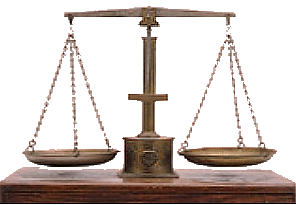|
|
|
 |
|
|
 |
|
 |
 |
 |
 |
 |
 |
 |
 |
 |
 |
 |
 |
 |
 |
 |
 |
 |
 |
 |
 |
 |
 |
 |
 |
 |
 |
|
The Superior Court's Divisions |
|
|
|
 |
|
|
|
The four principal trial divisions of the Supreme Court are:
Civil Criminal Housing Family
|
|
|
|
CIVIL |
|
|
|
Cases where one party sues another, such as in landlord-tenant disputes, auto or personal accidents, product or professional liability incidents, or contract
disputes, are heard in the Civil division of the Superior Court. Monetary damages are usually sought after by the accusing party (plaintiff) from another party (defendant). Depending on the nature of the claim or
preference of the parties, the case can be decided by either a judge or a jury. The Civil division is further divided into five parts: landlord-tenant, small claims, administrative appeals, civil jury, and civil non-jury
. |
|
|
CRIMINAL |
|
|
|
When a person (defendant) is accused of breaking the law, the case is heard in the criminal division of Superior Court. There are two sides in a criminal case-
the defendant, and the state. The state's attorney represents the state, because crimes are considered as acts that violate the rights of the entire state.
Three types of cases are heard in the Criminal Division:
Crimes (felonies and misdemeanors), violations, and infractions (do not require a court appearance).
There are four parts of the Criminal Division:
PART A: These include capital felonies, class A felonies, and unclassified felonies punishable by sentences greater than twenty years. PART B: includes
class B felonies and unclassified felonies punishable by sentences of ten to twenty years PART C: includes class C felonies and unclassified felonies punishable by sentences of five to ten years PART D: class D
felonies and all other crimes, motor vehicle violations, and infractions
|
|
|
HOUSING DIVISION |
|
|
|
Special housing sessions are held in the Bridgeport, Hartford, New Haven, Stamford-Norwalk and Waterbury judicial districts, hearing cases involving housing
matters. In any other judicial district, these cases are part of the regular civil docket. There are clerks that provide assistance to litigants, and housing specialists mediate cases and perform inspections.Summary
process (eviction), small claims, administrative appeals, payment into court, and civil and criminal cases both jury and non-jury are heard at judicial district housing sessions. |
|
|
|
FAMILY DIVISION |
|
|
|
This division is responsible for the timely and just resolution of family relations matters, including resolution of marriage, child custody, relief from abuse,
and family support payments. Juvenile matters include termination of parental rights, delinquency, and child abuse and neglect.
There are three parts of the Family Division: Juvenile matters (age under 16), family
support and paternity, and all other family relations matters, which include resolution of marriage. |
|
|
|
 |
|
|

